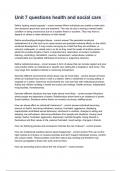Unit 7 questions health and social care
Define 'lacking mental capacity' - correct answer-When individuals are unable to make their
own decisions about their care and treatment. This may be due to having a mental health
condition or being unconscious due to a sudden illness or accident. They may have to
depend on others to make decisions on their behalf.
Define emotional/psychological abuse - correct answer-The persistent emotional
maltreatment of a child such as to cause severe and persistent adverse effects on the child's
emotional development. It may involve conveying to a child that they are worthless, or
unloved, inadequate, or valued only in so far as they meet the needs of another person. In
adults this includes threats of harm or abandonment, deprivation of contact, humilation,
blaming, comtrolling, intimidation, coercion, harrassment, verbal abuse, isolation or
unreasonable and unjustified withdrawal of services or supportive networks.
Define institutional abuse - correct answer-A form of abuse that can include neglect and poor
care practice within an institutional or specific care setting like a hospital or care home. This
may range from isolated incidents to continuing ill-treatment.
Describe different environments where abuse may be more likely. - correct answer-At home
where an individual lives alone or with a a relative, within a residential or nursing setting, in
hospitals or in public. Some key environments are: care services with institutional practices,
Adults and children residing in health and social care settings, Health services, Independent
living facilities, Homelessness.
Describe different situations that may make abuse more likely. - correct answer-Situations
where people are dependent of others, Relationships where there's an imbalance of power,
Social isolation, Situations where there's an invasion of privacy, staffing issues.
How can abuse affect an individual's behaviour? - correct answer-Individual becoming
anxious or fearful, becoming withdrawn, anxious, frustrated, aggressive, displaying
inappropriate uninhibited sexual behaviour, reluctance to undress, changes in eating and
sleeping, low self-esteem, becoming withdrawn from people and situations, having mood
swings, fearful, frustrated, aggressive, depressed, suicidal thoughts, losing interest in
themselves and their values in life, passive frustrated, mood swings, changes in friends.
How can following policies and procedures minimise the risk of abuse? - correct answer-
How can institutional practises lead to abuse happening? - correct answer-This can involve
rigid routines an intrusive or invasive practises and don't respect individuals' privacy, comfort
and unique needs. These practises could form day-to-day working and therefore may
become acceptable to those who work and live there.
How can promoting choice reduce the risk of abuse? - correct answer-




